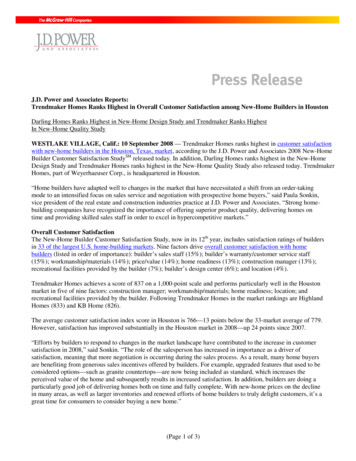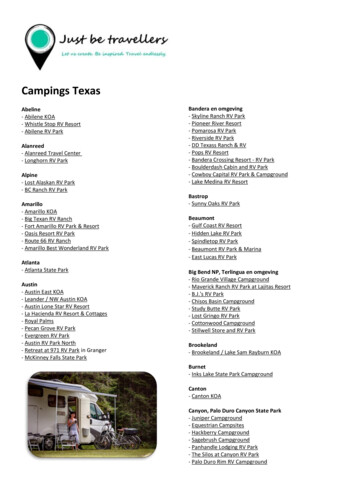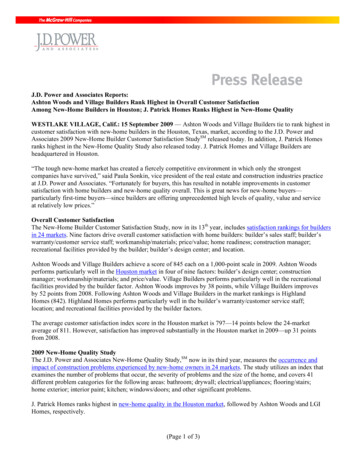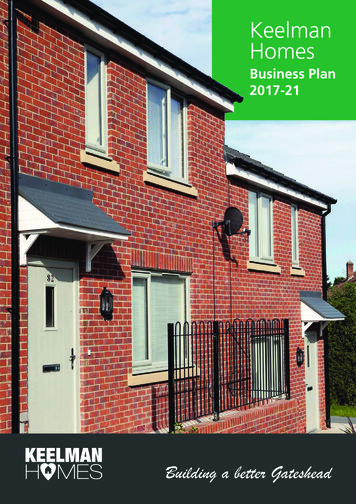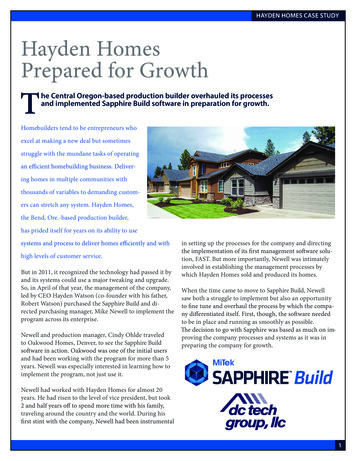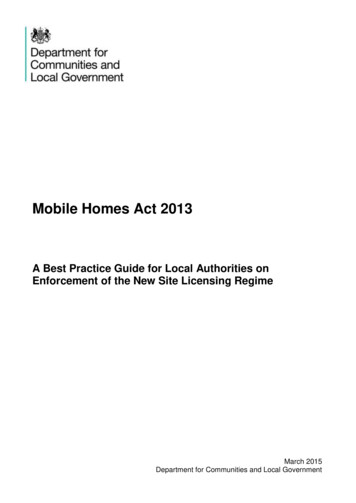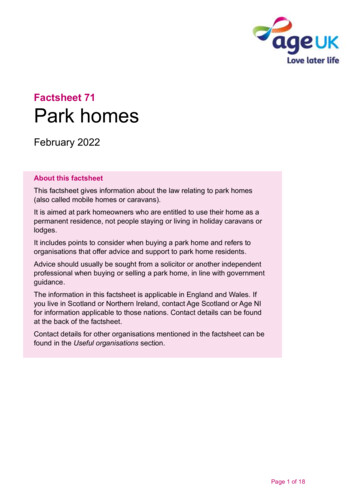
Transcription
Factsheet 71Park homesFebruary 2022About this factsheetThis factsheet gives information about the law relating to park homes(also called mobile homes or caravans).It is aimed at park homeowners who are entitled to use their home as apermanent residence, not people staying or living in holiday caravans orlodges.It includes points to consider when buying a park home and refers toorganisations that offer advice and support to park home residents.Advice should usually be sought from a solicitor or another independentprofessional when buying or selling a park home, in line with governmentguidance.The information in this factsheet is applicable in England and Wales. Ifyou live in Scotland or Northern Ireland, contact Age Scotland or Age NIfor information applicable to those nations. Contact details can be foundat the back of the factsheet.Contact details for other organisations mentioned in the factsheet can befound in the Useful organisations section.Page 1 of 18
Contents1 Recent developments32 Introduction33 What to consider before you buy a park home54 Written statement55 Implied terms65.1 Security of tenure65.2 Re-siting of the park home75.3 Rights to sell your home75.4 Rights to gift your home85.5 Inheritance85.6 Other implied terms96 Express terms107 Site licence118 Utilities119 Repairs, adaptations and improvements1210 Help with Council Tax, pitch fees and bills1211 Resolving disputes13Useful organisations13Age UK17Support our work17Age UK factsheet 71Park homesFebruary 2022Page 2 of 18
1Recent developmentsIn England, a ‘fit and proper person’ test applies to the owner ormanager of a ‘protected’ park home site from 1 October 2021. These areresidential or ‘mixed-use’ (part-residential, part-holiday) sites.When assessing whether an owner or manager is fit and proper, thelocal authority must consider certain factors, including their businesshistory, and whether they: are competent to manage the site have broken any relevant laws have provided a basic, up-to-date criminal record check.The authority may take other relevant evidence into account or approvethe application subject to certain conditions being met. It is an offence fora protected site to operate without the owner or manager passing thetest or meeting any conditions applied, and, in the former case, theauthority can apply to have the site licence revoked.The authority must keep a register of site owners or managers deemedfit and proper, available for inspection at their offices or online.In Wales, similar rules apply under the Mobile Homes (Wales) Act 2013.More information is on the Welsh Government website bile-homes-wales-act20132IntroductionPark homes are typically prefabricated single-storey houses that aremanufactured off-site and installed on land owned privately or by a localauthority. They are also called mobile homes or caravans.To be classed as a park home, the house must be capable of beingmoved from one place to another, either on its own wheels or by beingtowed or transported by another vehicle. It must not be more than 20metres in length, 6.8 metres in width, and 3.05 metres from floor to theceiling internally.It is possible to rent or own a park home. If you buy a park home, it is thehome you purchase, not the ‘pitch’ it stands on. You rent this from theowner of the park home site, paying a fee. This is usually payablemonthly, but may be paid weekly or annually, depending on what your‘pitch agreement’ says.This factsheet looks at the rights of park homeowners, not renters. Itlooks at the rights of owners whose pitch agreements are ‘protected’under the Mobile Homes Act 1983 or the equivalent Welsh legislation.Age UK factsheet 71Park homesFebruary 2022Page 3 of 18
Which pitch agreements are protected?Your agreement is protected if both the following conditions apply: you are entitled to station your park home on land forming part of a‘protected site’ (see below for a definition) you are entitled to occupy it as your only, or main, residence.If you are thinking of buying a park home to use as your only or mainresidence, or moving your permanent home to a new park, it isextremely important your agreement with the site owner is protected.Which sites are protected?A site is protected if its planning permission or site licence allows both: residential use of the site by some, or all, of the residents caravans to be stationed on the site all-year round.It is also important to find out if the site owner’s right to the land orplanning permission is time limited, as this can affect the rights you haveunder your agreement.The Leasehold Advisory Service (LEASE) provide free initial advice onthe law relating to park homes. They have a helpline and a range ofonline guides. Alternatively, contact an advice agency like CitizensAdvice or your local Age UK or Age Cymru.Important - living full time without permissionYou are not in a strong position if you are treating a holiday caravan orlodge as your main or only residence. This could be a caravan on anunprotected site, for example, a site licensed for holiday use only, or acaravan stationed on the non-residential part of a mixed-use site.Seek specialist legal advice immediately if you are threatened witheviction. It is important to check the terms of your agreement and the sitelicence. The agreement is a contract which binds you and the site owner.Unless you are in breach of the terms, you should be able to stay on thepark until the agreement terminates.If you own a holiday caravan, you can get advice on your security oftenure from the National Association of Caravan Owners. You mustbecome a member first, paying their membership fee. If you were soldyour home for year-round use but the agreement or site licence preventsthis, seek specific park homes legal advice.Specialist legal adviceOfficial government guidance strongly recommends you get help from anindependent professional, such as a solicitor, when buying or selling apark home. They should be independent of the site owner. You can askfor initial help from LEASE or go to https://solicitors.lawsociety.org.uk/Age UK factsheet 71Park homesFebruary 2022Page 4 of 18
3What to consider before you buy a park homeThe questions you need to consider when buying a park home include: do I understand my rights and obligations as a park homeowner? is the site licence indefinite and for a residential park? am I happy with the terms of the agreement? can I tour the park unaccompanied, meet and talk to the residents? what are the energy supply arrangements – do I buy my energy from thesite owner? are the pitch fees and other charges clearly stated in the agreement? what are the site rules? is there a residents’ association on the site?As with any other home purchase, seek advice from a solicitor or otherindependent professional. You may wish to have an independent surveycarried out by a qualified surveyor or ask to see any warranty.Note, homes intended for permanent living should be built to a specificresidential British Standard (BS3632).See the government factsheet Buying a park home for more informationat ome4Written statementIf you buy a new park home, the site owner must provide you with awritten statement at least 28 days before any agreement of sale is made.This must include: your name and address and the name and address of the site owner the date the agreement commences a description and plan of the pitch details of the site owner’s right to the land (their legal ‘interest’) the date when the site owner’s legal interest or planning permission isdue to end (if applicable) and an explanation of how this affects yourright to stay terms ‘implied’ into the agreement by law which cannot be overridden any additional terms agreed with the site owner (‘express’ terms) the pitch fee, the services paid for and the period for which it is payable the procedure for review of the pitch fee any additional charges, e.g. for utilities or other services (although thegovernment plans to prevent separate service charges being levied).Age UK factsheet 71Park homesFebruary 2022Page 5 of 18
If the site owner fails to produce a written statement, you can apply tothe First-tier Tribunal (Property Chamber) in England or the ResidentialProperty Tribunal in Wales for an order requiring a statement to beproduced. In this factsheet, we call these bodies ‘the Tribunal’.If you buy a pre-owned home from someone living on a park, theirwritten statement is assigned to you at the time of sale. The expressterms have already been agreed by them and you have no right todemand they are varied.5Implied termsImplied terms are rights inserted into all agreements by law, whichcannot be excluded or waived by the site owner. They are the minimumrights park homeowners have and apply even if not included in a writtenstatement, or where a written statement has not been provided.5.1Security of tenureSecurity of tenure is how easy or difficult it is to terminate your pitchagreement, meaning you must sell your home or move it elsewhere.You have the right to keep your home on the site you occupy indefinitely,or for as long as the site owner’s planning permission or right to the landlasts. If there is a time limit, the site owner must put this in the writtenstatement.You can bring your agreement to an end at any point by giving fourweeks’ notice. The site owner can only bring the agreement to an end byapplying to the County Court on any of the following grounds: the park home is not your only or main residence. the home has a detrimental effect on the amenity of the site, due to itscondition. If so, the Court can adjourn proceedings to allow repairs to bedone. you have broken the terms of the agreement, for example, you are inarrears with your pitch fee and the Court thinks it is reasonable to endthe agreement. The site owner must tell you that you have broken theagreement and give you enough time to put things right.Any dispute about the terms of the agreement or the condition of thehome normally needs to be resolved by the Tribunal before the Courtcan decide whether it is reasonable to end the agreement.The site owner can ask the Court to end the agreement and make anorder authorising them to regain possession of the pitch at the sametime.If your agreement ends, you have the right to recover any upfrontpayments made under it, so long as these relate to the period after itends.Age UK factsheet 71Park homesFebruary 2022Page 6 of 18
If you live on a protected site and are entitled to occupy your caravan asa sole or main residence, it is a criminal offence for your site owner toevict you without a court order.It is an offence for a site owner to carry out acts likely to interfere withyour peace or comfort, or to withdraw or withhold services from you. Thisincludes cutting off services such as electricity or gas, being aggressive,or threatening to tow your home off the site.Seek independent specialist legal advice or contact the local authority orpolice if this happens. Local authorities can prosecute site owners foroffences of illegal eviction or harassment.5.2Re-siting of the park homeThe site owner may be able to move your home to another part of thesite to carry out essential or emergency works. This means repairs to thebase on which your home is stationed, works or repairs needed tocomply with any relevant legal requirements, and works or repairsfollowing a natural disaster such as a flood or landslide.If the site owner wants to move your home for other reasons, they mustapply to the Tribunal, who must be satisfied the move is reasonable. Inall cases, the new pitch must be similar to the original one and the siteowner must cover all expenses incurred in connection with the movesuch as the cost of transporting the home and reconnection chargesIf you are moved so the owner can replace or carry out repairs to thebase, you have the right to insist on your home being returned to theoriginal pitch on completion of the work.5.3Rights to sell your homeYou have the right to sell your home on the park site, along with yourpitch agreement. The process depends on when your pitch agreementwas made or last ‘assigned’. An agreement is assigned when it is passedon to another person.Relevant dateIf your pitch agreement was made before 26 May 2013 in England or 1October 2014 in Wales (the ‘relevant date’) and has not been assignedsince, you must send a ‘Notice of proposed sale’ to the site owner.The owner has 21 days to apply to the Tribunal for a refusal order. Thiscan only be made on limited grounds, including if the proposed newoccupier or member of their household would breach site rules becauseof their age or the fact they keep certain pets.If your pitch agreement was made on or after the relevant date or hasbeen assigned since, you do not need to send the site owner a ‘Notice ofproposed sale’. You do not need to involve the site owner until after thepark home is sold. This is the case even if they say otherwise.Age UK factsheet 71Park homesFebruary 2022Page 7 of 18
In all cases, you must give a prospective buyer a ‘Buyer’s informationform’ along with required documents. The buyer must send a ‘Notice ofassignment’ form to the site owner within seven days of the sale beingcompleted. The site owner is entitled to a commission from the sale of upto 10 per cent.Seek specialist legal advice, as failing to meet your duties can result inlegal action being taken against you by the buyer. For more information,see the government factsheet Selling or gifting a park home fting-a-park-home5.4Rights to gift your homeDuring your lifetime, you have the right to give (‘gift’) your home andpitch agreement to a member of your family. The process you followdepends on when your agreement was made or last assigned.If your pitch agreement was made before the relevant date (as above)and has not been assigned since, you must send a ‘Notice of proposedgift’ form to the site owner. The site owner has 21 days to apply to theTribunal for a refusal order, which can only be made on certain limitedgrounds.You do not have to send a formal notice if your agreement was made onor after the relevant date or has been assigned since then. You mustprovide the site owner with evidence of your relationship to the person towhom you intend to gift your home.In both cases, your family member must send a ‘Notice of assignment’form to the site owner within seven days of the transfer of ownership.You do not have to pay a site owner commission on your gift.NoteFamily member means a partner, civil partner, spouse, parent,grandparent, child, grandchild, brother, sister, uncle, aunt, nephew,niece or a relative by marriage or half-blood.5.5InheritanceIf you die whilst occupying the park home as your only or mainresidence, a member of your family living with you at the time inherits theagreement with the site owner and all your legal rights. A husband, wifeor civil partner has preference over another family member.If no member of your family lives with you at the time, whoever inheritsthe home has the right to sell it. They have no automatic legal right tolive in the home but can do so with the site owner’s permission.Seek specialist advice if you want to know more about who can inherityour park home, or if the site owner is disputing your rights.Age UK factsheet 71Park homesFebruary 2022Page 8 of 18
5.6Other implied termsThese include: your right to ‘quiet enjoyment’ of the park home – this means youmust not be harassed or intimidated, and the supply of utilities must notbe interrupted. the site owner’s right of entry to the pitch (but not the park homeitself) – unless certain circumstances apply, the site owner must giveyou 14 days’ written notice before entering your pitch. the procedure for reviewing the pitch fee – the pitch fee can only bereviewed annually and changed with your agreement or if the Tribunalmakes an order. There is a presumption that it will only increase ordecrease in line with the Retail Price Index (in England) or ConsumerPrice Index (in Wales). Changes on other grounds, for example, siteimprovements, must meet specified criteria set out in the implied terms. the site owner’s obligations – the site owner is responsible formaintaining the park home’s base, communal areas, and supply of anyservices provided, for example gas, electricity, water and sewerage.They must consult you if they want to make improvements to the site.They must provide evidence to explain charges payable under theagreement on request and for free. your obligations – you must pay your pitch fee and other charges, keepyour park home in a sound state of repair, maintain the outside of thepark home and the pitch in a clean and tidy condition and, if requested,provide the site owner with documentary evidence of any costs orexpenses in respect of which you are seeking reimbursement. a ‘qualifying’ residents’ association– a residents’ association thatmeets certain conditions (‘qualifies’) must be formally recognised by thesite owner and consulted if the owner wishes to make changes to theoperation and management of the site.In England, see the Department for Levelling Up, Housing andCommunities factsheet Consolidated implied terms in park home pitchagreements at lied-terms-in-park-home-pitch-agreementsIn Wales, contact LEASE for initial advice, Citizens Advice, or AgeCymru Advice.Age UK factsheet 71Park homesFebruary 2022Page 9 of 18
6Express termsThe express terms of the agreement are not ‘implied’ by the law. Instead,they are drawn up by the site owner.Express terms usually cover areas such as the services provided by thesite owner and their obligation to maintain the park and its facilities, youruse of your home and pitch, and your obligation to keep your home inrepair. They cannot conflict with the implied terms by undermining thesite owner’s implied obligations or your implied rights.Express terms can be altered by agreement with the site owner or byorder of the Tribunal. Within six months of entering into an agreement,you can apply to the Tribunal for a term to be inserted, deleted or varied.This does not apply if an existing agreement was transferred to youwhen the home was gifted or sold (‘assignment’).After six months, neither you nor the site owner has the right to changethe express terms unless you both agree to do so.Site rulesNot all park home sites have site rules, but if they do, the rules are partof the express terms of pitch agreements. They may restrict occupationof the park to certain age groups or stop you keeping certain pets.Site rules are only effective if they are made following a very specificprocedure. They can be varied or deleted if the site owner follows thesame specific procedure.Once agreed, they must be deposited with the local authority within aspecified time period. Contact the local authority if you are unsure aboutyour site rules and want to look at any rules the owner has deposited.Certain site rules cannot be enforced as they are deemed to be unfair.These include rules that: prevent you from selling or gifting your home to anyone but the siteowner require you to provide the site owner with the home address and contactdetails of a proposed new occupier and other personal and financialinformation about them prohibit you from making improvements to your home or pitch require you to pay certain unauthorised deposits or charges require you to use tradespeople appointed by the site owner or onlypurchase goods and services supplied by them.A full list of unenforceable terms in England is in the Mobile Homes (SiteRules) (England) Regulations 2014.In Wales, see the Mobile Homes (Site Rules) (Wales) Regulations 2014.Age UK factsheet 71Park homesFebruary 2022Page 10 of 18
7Site licencePrivate sites must be licensed by the local authority. Sites owned by thelocal authority do not have to be licensed but should operate to similarstandards.A licence is only issued if the park has planning permission. A copy of thelicence must be displayed on the park notice board where it can easilybe seen. The licence should state whether: the park is for residential or holiday use, and it has indefinite planning permission, or a date of expiry if it is leased.It is extremely important to establish these two points if you areconsidering moving to a particular site.The licence may have other conditions attached, for example around thenumber of homes that can be stationed on the site, fire safety, health andsafety, and landscaping. Any complaints about these issues that cannotbe resolved with the site owner should be directed to the local authority.8UtilitiesSome park homeowners pay their bills directly to their energy supplier, oras part of their pitch fee.However, it is common for the account to be in the site owner’s name,with the energy re-sold to residents on a pro-rata basis.If so, there is a maximum amount the site owner can charge (the‘Maximum Resale Price’). This applies to water and sewerage servicestoo. There is no Maximum Resale Price for liquefied petroleum gas (LPGor LP gas) in cylinders or bulk tanks.For gas and electricity, the Maximum Resale Price is the amount the siteowner paid per unit of energy, including standing charges. Your share ofthe total bill will be calculated according to your individual consumptionor, if you do not have a meter, other factors such as your floor space orhousehold size. For more information, contact Citizens Advice consumerservice.Anyone reselling water or sewerage services should charge no morethan the amount they are charged by the water company plus areasonable administration fee.Maintenance costs for water or sewerage pipe work are not included inthe resale price. These costs are usually recovered through the pitch feeor by separate agreement. For more information, contact the Office ofWater Services, OFWAT.Age UK factsheet 71Park homesFebruary 2022Page 11 of 18
9Repairs, adaptations and improvementsIf you need to make repairs or other home improvements such asdisability-related adaptations, you may be able to get help from the localauthority, a charity or Home Improvement Agency.Seek advice before carrying out any major works to ensure this does nottake your property outside the definition of a mobile home. For example,adding exterior cladding for extra insulation increases the width of yourhome and may take it outside the legal definition. Adding a conservatoryor porch may have the same effect. For more information, see factsheet67, Home improvements and repairs.For information on making your home more energy efficient and helpwith heating costs, see factsheet 1, Help with heating costs or, in Wales,Age Cymru factsheet 1w, Help with heating costs in Wales.10Help with Council Tax, pitch fees and billsIf your park home is your sole or main residence, you are responsible forpaying Council Tax. If you live alone, a 25 per cent discount applies. Ifyou are on a low income, you may be able to claim Council Tax Supportin England, or Council Tax Reduction in Wales.If you are on a low income, you may be able to get help towards yourpitch fees through Housing Benefit, Pension Credit, or Universal Credit.For more information, contact your local authority or an advice agencysuch as Citizens Advice or your local Age UK or Age Cymru.Warm Home DiscountThe Warm Home Discount is a one-off 140 payment applied toelectricity bills to help with the cost of energy over the winter months.The scheme is centrally managed for park home residents, so you do notneed to have a direct relationship with a particular supplier to benefit.The main way you qualify for a payment is if you or your partner receivePension Credit Guarantee Credit (or Guarantee and Savings Credit). Youmust also be paying Council Tax. The other ways are: you are in receipt of other eligible means-tested benefits, includingUniversal Credit with a limited capability for work element you have a mental or physical disability or illness, or someone in yourhousehold is vulnerable, and your gross annual household income isless than 16,190 your gross annual household income is less than 16,190 and youspend 10 per cent or more of this on energy bills to heat the property.The scheme is currently closed as it is oversubscribed. It is administeredby Charis Grants, who anticipate it re-opening in September 2022. Toregister your interest for 2022, see the Charis Grants website.Age UK factsheet 71Park homesFebruary 2022Page 12 of 18
11Resolving disputesMost disputes between park homeowners and site owners can be dealtwith by the Tribunal. This includes disputes about pitch fees, the expressterms of an agreement and the written statement. For guidance andapplication forms, see the relevant Tribunal website.Alternatively, if both you and the site owner agree to do so, you coulduse an arbitrator. The arbitrator’s decision is binding and you cannotusually go to Court at a later stage if you do not accept it.There are pros and cons to using either of the above and you may wantto take specific legal advice from a specialist park home qualified lawyerbefore making your decision. Although taking a case to the Tribunal isusually ‘cost-free’, meaning each side pays its own legal expenses andcosts, you can be required to pay the other side’s costs in certaincircumstances. For more information about getting advice, see factsheet43, Getting legal and financial advice.In addition, the government produces a range of factsheets for parkhomeowners, including Park homes: know your rights. This has aflowchart taking you through the steps of selling or gifting your home.The full range of factsheets can be found here on the governmentwebsite: www.gov.uk/government/collections/park-homesIn Wales, see the Welsh Government website at: https://gov.wales/parkmobile-homes.Age UK factsheet 71Park homesFebruary 2022Page 13 of 18
Useful organisationsCharis Grants Ltdwww.parkhomeswhd.comTelephone 0330 380 1040Manages the Warm Home Discount scheme for park home residents.The scheme is currently closed to new applications, but you can ask tobe contacted if more funds become available.Citizens AdviceEngland or Wales go to www.citizensadvice.org.ukIn England telephone 0800 144 8848In Wales telephone 0800 702 2020National network of advice centres offering free, confidential,independent advice, face to face or by telephone.Citizens Advice Consumer Servicewww.citizensadvice.org.uk/consumer serviceTelephone 0808 223 1133Provides information and advice to consumers by telephone and online.Department for Levelling Up, Housing and homesTelephone 0303 444 0000Publishes a series of downloadable factsheets relating to park homes. InWales, see the entry Welsh Government below.First-tier Tribunal (Property Chamber)www.gov.uk/housing-tribunalsSee the website for details of local offices. In Wales, see the entryResidential Property Tribunal Wales below.Independent Park Home Advisory Service (IPHAS) (The)www.iphas.co.ukTelephone 0800 612 8938 (advice for members, must quote membershipnumber)An advisory service for park homeowners. Membership fee required.LEASE (Leasehold Advisory ne 020 7832 2525 or Freephone 080 8196 2212Provide free initial advice on the law relating to park homes in Englandand Wales by telephone or email. They have a range of advice guides onpark homes on their website.Age UK factsheet 71Park homesFebruary 2022Page 14 of 18
National Association of Caravan Owners (NACO)https://www.nacoservices.com/Telephone 01255 820 321A membership organisation offering advice and support to holidaycaravan owners. Full membership costs 30 per year and allows accessto unlimited advice and support from team of specialists by phone oremail, members-only resources and discounted products and services.National Caravan Council (The)www.thencc.org.uk/Telephone 01252 318251A representative body for the residential park home industry.Office of Water Services (OFWAT) (The)www.ofwat.gov.ukTelephone 0121 644 7500The independent regulatory body set up to monitor and regulate theactivities of the water companies.Residential Property Tribunal Telephone 03000 252 777Welsh Governmentwww.gov.walesTelephone 0300 060 4400The devolved government for Wales. Information on park homes isavailable at: https://gov.wales/park-mobile-homes.Age UK factsheet 71Park homesFebruary 2022Page 15 of 18
Age UK factsheet 71Park homesFebruary 2022Page 16 of 18
Age UKAge UK provides advice and information for people in later life throughour Age UK Advice line, publications and online. Call Age UK Advice tofind out whether there is a local Age UK near you, and to order freecopies of our information guides and factsheets.Age UK Advicewww.ageuk.org.uk0800 169 65 65Lines are open seven days a week from 8.00am to 7.00pmIn Wales contactAge Cymru Advicewww.agecymru.org.uk0300 303 4498In Northern Ireland contactAge NIwww.ageni.org0808 808 7575In Scotland contactAge Scotlandwww.agescotland.org.uk0800 124 4222Support our workWe rely on donations from our supporters to provide our guides andfactsheets for free. If you would like to help us continue to provide vitalservices, support, information and advice, please make a donation todayby visiting www.ageuk.org.uk/donate or by calling 0800 169 87 87.Age UK factsheet 71Park homesFebruary 2022Page 17 of 18
Our publications are available in large print andaudio formatsNext update February 2023The evidence sources used to create this factsheet are available onrequest. Contact resources@ageuk.org.ukThis factsheet has been prepared by Age UK and contains general advice only, whichwe hope will be of use to you. Nothing in this factsheet s
Age UK factsheet 71 February 2022 Park homes Page 5 of 18 3 What to consider before you buy a park home The questions you need to consider when buying a park home include: do I understand my rights and obligations as a park homeowner? is the site licence indefinite and for a residential park? am I happy with the terms of the agreement? can I tour the park unaccompanied, meet .
